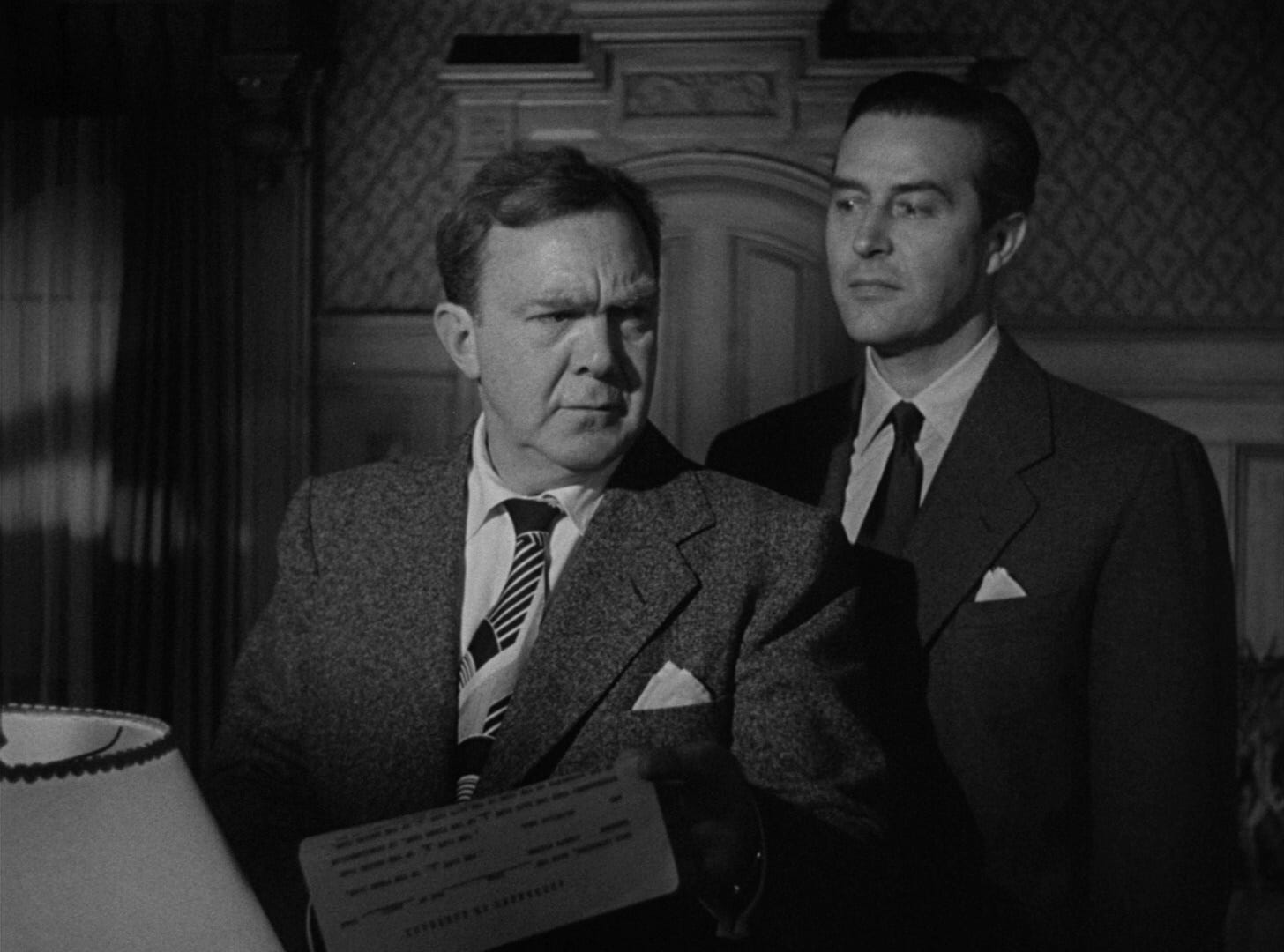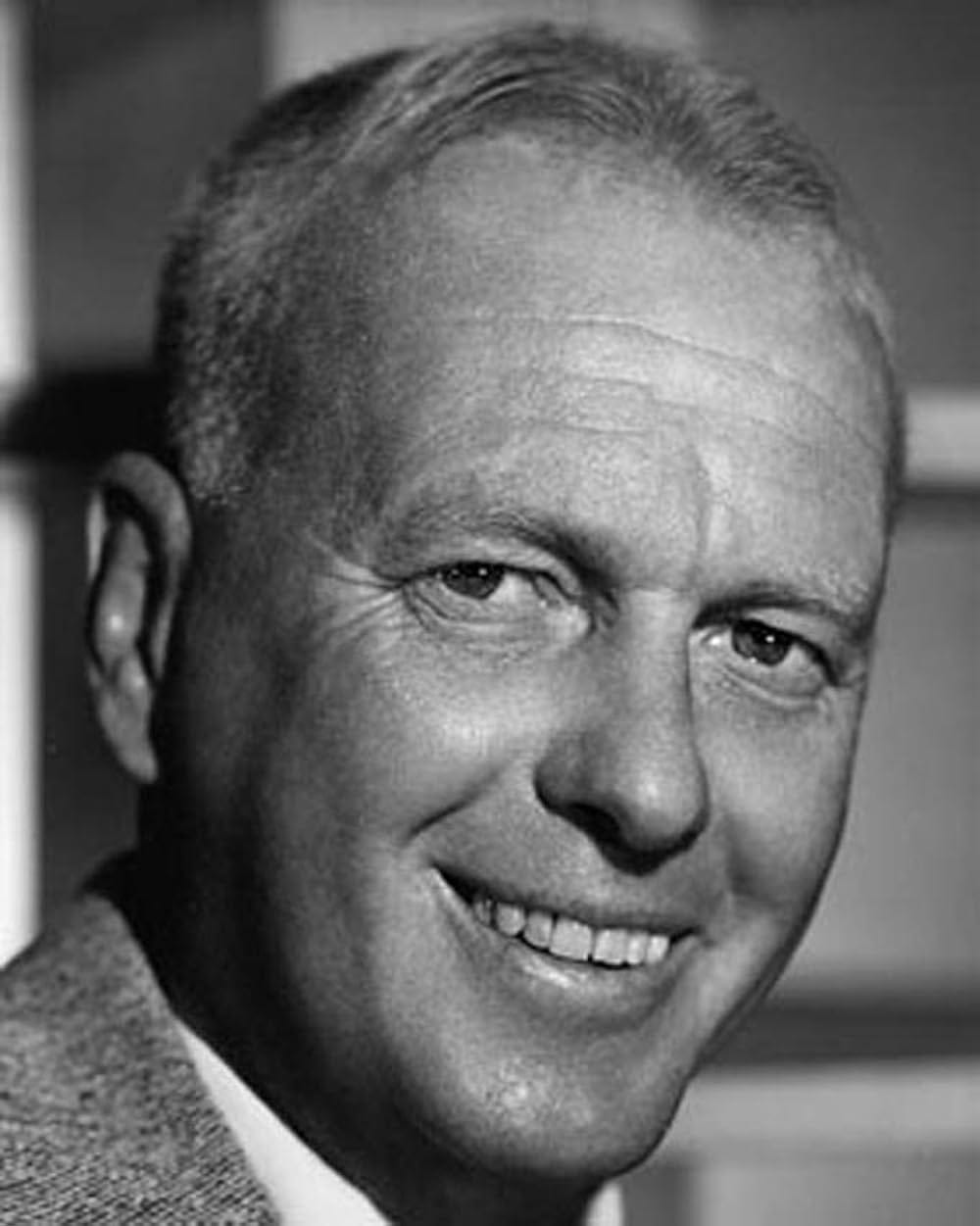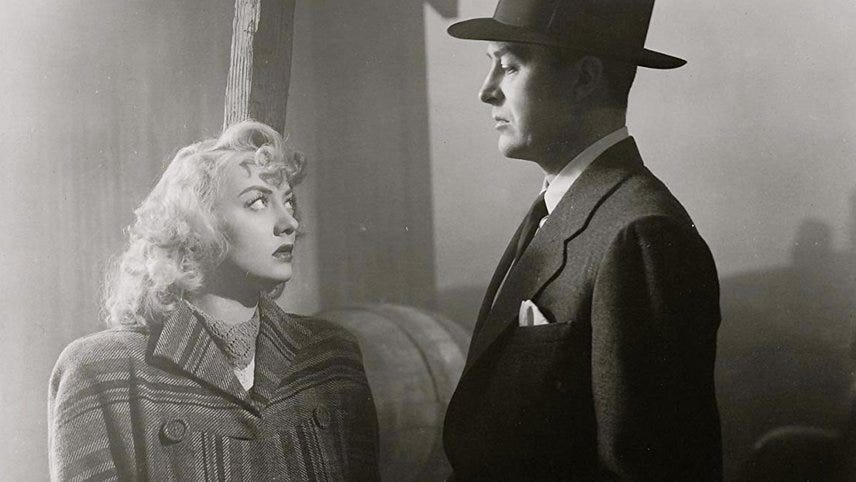Plot: A district attorney's ambition leads him to make a Faustian pact with a mysterious figure, spiraling him into a moral descent as he struggles with the consequences of his deal.
Directed by: John Farrow
Written by: Jonathan Latimer (based on the story my Mindret Lord)
Cinematography by: Lionel Lindon
Studio: Paramount Pictures
Runtime: 1 hour 33 minutes
In November 2014, I was living in Chicago when I heard that Noir City was hosting a festival in Kansas City. Without hesitation, I booked my plane tickets. I’d already experienced the Noir City festivals in Chicago and Los Angeles, but Kansas City was new to me, and I couldn’t resist the chance to explore it.
This lead me to using Airbnb for the first time. A co-worker at the school where I was teaching recommended this new website where you could book a bed in someone’s actual home. I was skeptical, but the price and location were too good to pass up. It turned out to be a great experience—the host’s boyfriend even gave me a lift to the theater for my night of noir. The next morning, they suggested a breakfast spot where I unexpectedly ran into Eddie Muller and Gun Crazy star Peggy Cummins. It was a fantastic weekend.
But I’m telling you all this to get to the short-lived Noir City Kansas City film festival. We watched The Asphalt Jungle, Gun Crazy, and a movie I had never heard of: Alias Nick Beal. I was shocked I hadn’t come across this film before—and even more shocked at how great it was! A top-tier cast in a morality tale shrouded in fog? It was noir heaven.
I didn’t catch this film again until Turner Classic Movies aired it—if I remember right, it was in 2017. I made sure my parents were free, and we watched it together. Then, in 2021, Kino Lorber released a Blu-ray, giving me the chance to revisit it once more. Since it wasn’t readily at my fingertips for a long time, I had to seize every opportunity to watch it.
The film has a familiar premise: a man sells his soul for power and gain to someone who appears to be an agent of the devil. In this case, he seeks to climb the political ladder. Thomas Mitchell (Stagecoach) plays Joseph Foster, a district attorney who fails to prosecute a known criminal When he says he would sell his soul to put him behind bars, Nick Beal (Ray Milland) appears out of nowhere and makes a bargain with him, one that will put him on the path to becoming the governor.
Two women play a prominent role in Foster’s political crusade. His wife, Martha (Geraldine Wall), tries desperately to keep Joseph on the straight and narrow, often trying to point out the dangers of Beal’s enticings. The other woman is a never-better Audrey Totter, playing a fallen woman who enlists to Beal’s cause of corrupting Foster on his political journey.
The first question to tackle is whether this film qualifies as a proper film noir. At its core, this movie is an update of the Faust legend—a man sells his soul to the devil for worldly gain. This premise firmly places it in the realm of fantasy and morality tales, not the usual territory for film noir. Yet, the style of the film couldn’t be more noir. Shadows within shadows, a fallen woman luring a man astray, and Ray Milland sporting the blackest fedora I’ve ever seen on screen—all hallmarks of the genre. So, it comes down to style versus substance. Visually, it’s a quintessential noir, but in terms of structure and symbolism, the definition might need a bit of a stretch.
John Farrow (yes, Mia’s father), the director of Alias Nick Beal, made a surprising decision in 1949 when he turned down the opportunity to direct the adaptation of The Great Gatsby. On the surface, it seems curious—perhaps even unwise. After all, Farrow had successfully collaborated with Alan Ladd on films like China, Two Years Before the Mast, Calcutta, and Beyond Glory. And passing up the chance to adapt what many consider the quintessential American novel might seem like a missed opportunity. So why did Farrow choose Nick Beal over Gatsby? Allow me to speculate.
Farrow was a devout Catholic, deeply committed to his faith. He authored several books on Catholicism, including biographies of Father Damien and Thomas More, as well as Pageant of the Popes, a history of the papacy. Farrow wasn’t just a casual churchgoer; his religious beliefs were central to his life and work. Perhaps when he read the script for Alias Nick Beal, he felt a stronger connection to its themes of morality, temptation, and redemption as opposed to the Roaring ‘20s world of The Great Gatsby. Farrow’s faith might have shaped his approach to Nick Beal, imbuing the film with a deeper sense of spiritual gravity. I like to think that his belief influenced the story's weight and the moral dilemmas it explores.
This brings us to the casting of George Macready as Reverend Thomas Garfield. Macready was known for playing suave yet sinister characters—whether as Ballin Mundson in Gilda or Baron Philippe de Varville in Camille, he rarely portrayed kindness or compassion. Farrow’s choice to cast him as a reverend seems deliberate, perhaps echoing the idea that “every saint has a past, every sinner has a future.” Through Macready, Farrow might have wanted to show that redemption is possible—that’s the Good News, that everyone can find salvation.
And one more thing: as I was watching this movie for the third time, I kept wondering why this agent of darkness was named Nick Beal. A bit of research revealed that “Old Nick” is a colloquial nickname for Satan, less formal than Lucifer. As for "Beal," it could be a shortened nod to Beelzebub, one of the seven princes of Hell. It’s a cool, fitting name for a 1940s devilish character, no?
Alright, enough pontificating on my conjectures of Farrow’s faith. We’ve got to address the rest of the cast. Let’s start with the titular Nick Beal, played deliciously by Ray Milland. I love how he appears out of the fog the first time we meet him. Milland brings little tics and mannerisms, elevating his performance. He has a cool whistle that announces his presence. You’ll notice that nobody every touches Nick. Is there some sort of folk doctrine that says people can’t touch the devil? I’m not sure. I do know that in Mormonism, Joseph Smith taught that if you went to shake hands with a devil or demon, you would feel nothing. Perhaps it is/was a widespread idea in Christianity. Regardless, it’s a nice flair. Milland’s eyes are beautifully lit. They’re piercing and menacing. I wouldn’t want to cross him.
Thomas Mitchell is perfectly cast as the politician Joseph Foster, a man who starts out with noble intentions. We all know the path to hell is paved with good intentions, and Mitchell’s portrayal of Foster exemplifies this perfectly. He grounds the narrative in a character who is relatable yet driven by a desperate need to achieve his goals, no matter how virtuous they seem at first. Sure, sentencing a kingpin criminal sounds like a victory for the community, but Foster ultimately pays the price for his ambition.
Mitchell was a seasoned actor known for his versatility and depth, often portraying characters with warmth and gravitas. The Academy Award winner had a knack for bringing sincerity and humanity to his roles. In Alias Nick Beal, he channels that same authenticity, making Foster’s moral descent all the more tragic. His ability to portray the everyman, struggling between right and wrong, adds a poignant layer to the film’s exploration of corruption and the human condition.
And of course, we can’t forget one of noir’s staples, the femme fatale of this picture—Audrey Totter. This might be the first film we’re covering with her, but it definitely won’t be the last. We are truly blessed to have her in this film. In Alias Nick Beal, she plays Donna Allen, a fallen woman who quickly becomes a pawn in Nick Beal’s game. It’s clear that she’s a prostitute, something the production code didn’t allow direct references to. Somehow, they let it slide, perhaps because her character’s willingness to sell herself mirrors Foster’s own. Totter is fantastic in the role, making Donna’s allure a potent force that pulls Foster further into darkness. She’s a great guide on the river of corruption and temptation.
Farrow directs the hell out of this movie. He’s economical, knowing exactly where to place the camera and how much time to give his actors. One standout sequence has Beal rehearsing with Donna Allen on what she’ll say to seduce Foster. Moments later, when Foster enters the room, he unknowingly steps into the exact spot where Beal was standing. It’s a subtle yet powerful visual cue from Farrow, suggesting that Foster is doomed to follow in Beal’s footsteps, as if he has no choice but to mirror Beal’s actions in a preordained sequence of events. That’s the sinister reality of selling your soul to the devil.
Have politicians always been corruptible at the rate they are now? Perhaps, but what strikes me is how prescient Alias Nick Beal feels today—almost as if it anticipated the erosion of public trust and the normalization of political compromise. Watching it now, one can’t help but see it as a cautionary tale, a mirror held up to our own time, reflecting a reality we’ve become all too familiar with. It’s as though the film’s eerie foresight has caught up with us, making its story not just a relic of the past, but a chilling commentary on the present. It’s pretty sad if you think about it! Foster at least recognizes the err of his ways. We can only hope politicians today have that willingness to look inward.
In case it isn’t obvious, I’m a big fan of Alias Nick Beal. Shot by the talented Lionel Lindon, who also crafted stark visuals of The Manchurian Candidate, the film is a masterclass in atmospheric cinematography. Lindon lights the actors with precision, making the fog not just a backdrop, but almost a character in its own right. The trio of lead actors—Ray Milland, Thomas Mitchell, and Audrey Totter—play off each other brilliantly, each bringing depth and nuance to their roles. And the story? It’s just plain old fun.
If you haven’t seen Alias Nick Beal, do yourself a favor and check it out. It’s a film that defies easy categorization, blending elements of fantasy, morality tale, and noir into something truly unique. And when you do watch it, I’d love to hear your thoughts on whether it qualifies as a true film noir. I tend to think it does, but as with any great piece of cinema, it’s always open to interpretation.
Favorite line: Nick Beal: “The last time I was here was quite exciting. City was on fire. Picked up quite a lot of recruits that night. Made quite a transportation problem.”
Smoking: 🚬 🚬 out of 🚬 🚬 🚬 🚬
Fedoras: 🕵️🕵️🕵️🕵️ out of 🕵️ 🕵️ 🕵️ 🕵️ (Beal’s hat earns all four of these)
Femme Fatale: 💃💃💃💃 out of 💃 💃 💃 💃
Fog: 🌫️🌫️🌫️🌫️ out of 🌫️🌫️🌫️🌫️
Links of interest:
Here’s a TCM Commentary in The Lost Weekend and Alias Nick Beal
Here’s a link to purchase the DVD.
Here’s a link to stream it from Amazon.










